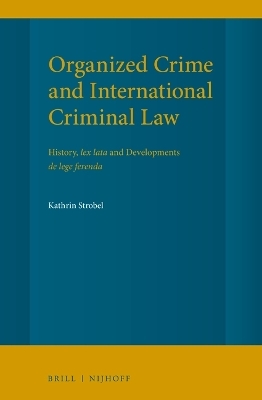
Organized Crime and International Criminal Law
Martinus Nijhoff (Verlag)
978-90-04-46257-1 (ISBN)
This book presents the first comprehensive study of international criminal jurisdiction over organized crime. Taking into account a broad range of profit-generating crimes, including human trafficking, migrant smuggling, drug trafficking, and illicit trade in arms and ammunition, Strobel draws a concise picture of who can be prosecuted for what under which circumstances by analysing the current legal framework as defined by the Rome Statute, and by discussing future developments that could further facilitate such prosecutions.
Whereas international criminal law in the strict sense has long been considered not to apply to organized crime, Strobel convincingly demonstrates that international criminal prosecutions hold underexploited potential to bring leaders of cartels and trafficking rings to justice.
Dr. iur. Kathrin Strobel, LL.M. (1989) is an expert in international criminal law, organized crime and rule of law. In addition to her academic publications, she works as an advisor to various governments and international organisations on these topics worldwide.
Abbreviations
Table of Treaties, Resolutions and Other Legal Documents
Table of Cases
1 Introduction
2 The Status Quo of Organized Crime in International Criminal Law
2.1 Organized Crime
2.1.1 Legal Definition of Organized Crime
2.1.2 Relevant Crimes
2.1.2.1 Drug Trafficking
2.1.2.2 Trafficking in Persons and Subsequent Exploitation
2.1.2.3 Migrant Smuggling
2.1.2.4 Illicit Trade in Arms and Ammunition, Natural Resources, and Cultural Goods
2.1.2.5 Corruption
2.1.2.6 Money Laundering
2.1.2.7 Organized Crime-Related Violence
2.1.3 Types of Organizations
2.1.3.1 Hierarchical Organized Criminal Groups
2.1.3.2 Criminal Networks
2.1.4 Geographic Scope
2.1.5 Impact of Organized Crime
2.2 Organized Crime in Transnational Criminal Law
2.2.1 The Current Role of International Law in Combating Organized Crime
2.2.2 Transnational Criminal Law Conventions
2.2.2.1 The UN Convention against Transnational Organized Crime and the Protocols Thereto
2.2.2.2 International Drug Control Conventions
2.2.2.3 Conventions against Corruption
2.2.2.4 Provisions on Money Laundering and Related Instruments
2.2.2.5 Other Transnational Criminal Law
2.2.3 Other Relevant International Conventions
2.2.4 Regional Criminal Law
2.2.5 The International Enforcement Regime
2.3 Organized Crime in International Criminal Law Stricto Sensu
2.3.1 The Evolution of International Criminal Law Stricto Sensu
2.3.2 The Relevance of International Criminal Law Stricto Sensu to Organized Crime
2.3.2.1 The Telos of International Criminal Law
2.3.2.2 Empirical Interconnection: The Crime–Conflict Nexus
2.3.3 Organized Crime in the History of International Criminal Law Stricto Sensu
2.3.3.1 Organized Crime Offenses in International Criminal Tribunals
2.3.3.2 Organized Crime Offenses and the Making of the Rome Statute
2.4 Assessment
3 Organized Crime under the Rome Statute of the International Criminal Court
3.1 Procedural Requirements for Jurisdiction
3.1.1 Trigger Mechanisms
3.1.2 Preconditions to the Exercise of Jurisdiction
3.1.3 The Principle of Complementarity
3.2 Substantive Law: Jurisdiction Ratione Materiae
3.2.1 The Crime of Genocide
3.2.1.1 Mental Element: The Dolus Specialis of Genocide
3.2.1.2 Material Elements
3.2.1.3 Summary
3.2.2 Crimes against Humanity
3.2.2.1 Contextual Elements
3.2.2.2 Material Elements: Individual Acts
3.2.2.3 Summary
3.2.3 War Crimes
3.2.3.1 Contextual Elements
3.2.3.2 Material Elements
3.2.3.3 Summary
3.3 Substantive Law: Attribution of a Crime
3.3.1 Perpetration
3.3.2 Participation
3.3.3 Superior Responsibility
3.4 Assessment
4 Organized Crime and International Criminal Law De Lege Ferenda
4.1 Potential Developments Within the Current Jurisdictional Framework
4.1.1 Mental Elements
4.1.1.1 Dolus Eventualis
4.1.1.2 The Dolus Specialis Requirement for Pillage
4.1.2 Material Elements: Trafficking in Persons and Enslavement
4.2 Expanded Jurisdiction Ratione Materiae
4.2.1 Criteria for the Introduction of New Offenses
4.2.2 Common Contextual Elements
4.2.3 Potential Offenses and Their Material Elements
4.2.3.1 The Crime of Drug Trafficking
4.2.3.2 Illicit Trade in Arms and Ammunition, Natural Resources, and Cultural Goods
4.2.3.3 The Crime of Migrant Smuggling
4.2.3.4 Corruption
4.2.3.5 Money Laundering
4.2.4 Summary
4.3 An International Tribunal Focused on Organized Crime
4.3.1 Procedural Requirements for Jurisdiction
4.3.2 Jurisdiction Ratione Materiae
4.3.3 Organizational Setup
4.4 Assessment
5 Conclusion
References
Index
| Erscheinungsdatum | 02.08.2021 |
|---|---|
| Sprache | englisch |
| Maße | 155 x 235 mm |
| Gewicht | 630 g |
| Themenwelt | Recht / Steuern ► EU / Internationales Recht |
| Recht / Steuern ► Öffentliches Recht ► Völkerrecht | |
| Recht / Steuern ► Strafrecht ► Kriminologie | |
| ISBN-10 | 90-04-46257-0 / 9004462570 |
| ISBN-13 | 978-90-04-46257-1 / 9789004462571 |
| Zustand | Neuware |
| Haben Sie eine Frage zum Produkt? |
aus dem Bereich


